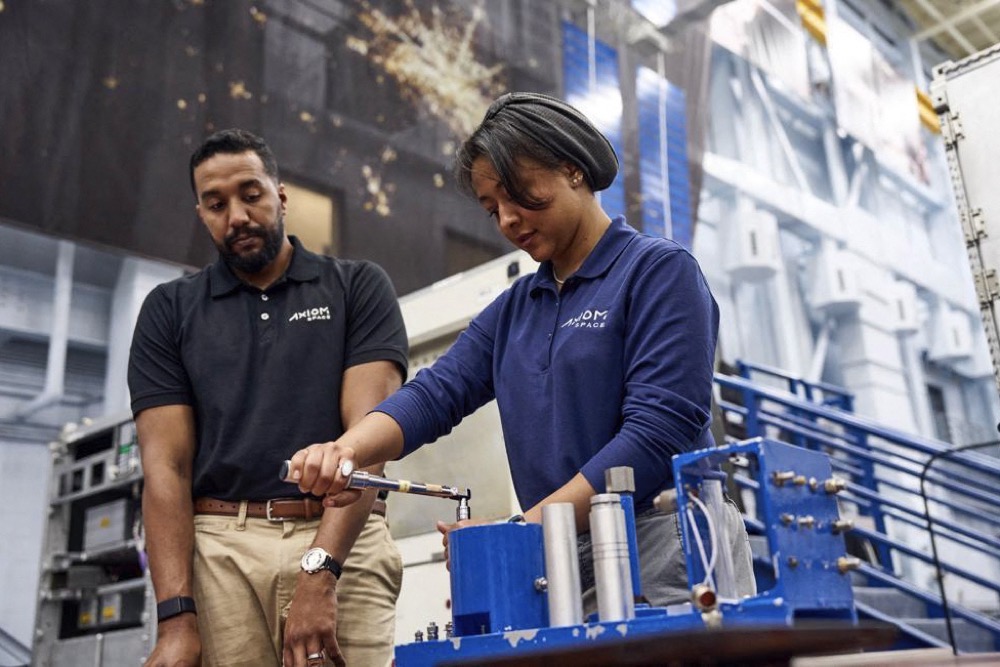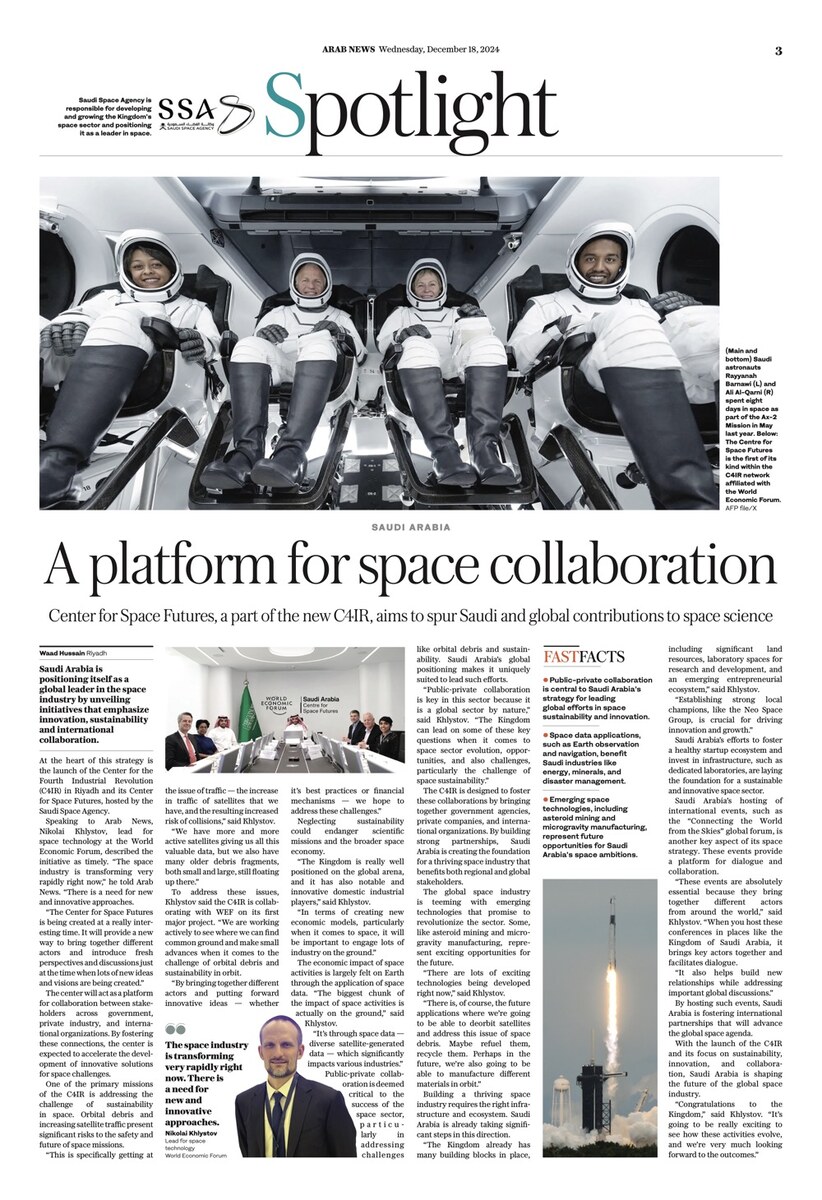RIYADH: Saudi Arabia is positioning itself as a global leader in the space industry by unveiling initiatives that emphasize innovation, sustainability and international collaboration.
At the heart of this strategy is the launch of the Center for the Fourth Industrial Revolution (C4IR) in Riyadh and its Center for Space Futures, hosted by the Saudi Space Agency.
This transformative initiative comes at a pivotal moment for the space sector, as the industry faces increasing demand for fresh approaches.
The C4IR reflects the Kingdom’s commitment to pioneering solutions that will drive growth and innovation in the global space economy. It is also a key pillar of Vision 2030 — Saudi Arabia’s roadmap to economic diversification and technological advancement.
Speaking to Arab News, Nikolai Khlystov, lead for space technology at the World Economic Forum, described the initiative as timely. “The space industry is transforming very rapidly right now,” he told Arab News. “There is a need for new and innovative approaches.

By building strong partnerships, Saudi Arabia is creating the foundation for a thriving space industry that benefits both regional and global stakeholders. (AFP)
“The Center for Space Futures is being created at a really interesting time. It will provide a new way to bring together different actors and introduce fresh perspectives and discussions just at the time when lots of new ideas and visions are being created.”
The center will act as a platform for collaboration between stakeholders across government, private industry, and international organizations. By fostering these connections, the center is expected to accelerate the development of innovative solutions for space challenges.
One of the primary missions of the C4IR is addressing the challenge of sustainability in space. Orbital debris and increasing satellite traffic present significant risks to the safety and future of space missions.
“This is specifically getting at the issue of traffic — the increase in traffic of satellites that we have, and the resulting increased risk of collisions,” said Khlystov.
“We have more and more active satellites giving us all this valuable data, but we also have many older debris fragments, both small and large, still floating up there.”

“The Center for Space Futures is being created at a really interesting time,” said Nikolai Khlystov. (Supplied)
To address these issues, Khlystov said the C4IR is collaborating with WEF on its first major project. “We are working actively to see where we can find common ground and make small advances when it comes to the challenge of orbital debris and sustainability in orbit.
“By bringing together different actors and putting forward innovative ideas — whether it’s best practices or financial mechanisms — we hope to address these challenges.”
Neglecting sustainability could endanger scientific missions and the broader space economy.
By focusing on innovative solutions like satellite recycling, deorbiting technologies, and traffic management, Saudi Arabia is taking a proactive approach to ensure the long-term sustainability of space activities.
Saudi Arabia’s investments in the space industry are aligned with its goal of becoming a major contributor to the global space economy. With a combination of strategic global partnerships and a strong domestic industrial base, Saudi Arabia is uniquely positioned to drive innovation.
FASTFACTS
• Public-private collaboration is central to Saudi Arabia’s strategy for leading global efforts in space sustainability and innovation.
• Space data applications, such as Earth observation and navigation, benefit Saudi industries like energy, minerals, and disaster management.
• Emerging space technologies, including asteroid mining and microgravity manufacturing, represent future opportunities for Saudi Arabia’s space ambitions.
“The Kingdom is really well positioned on the global arena, and it has also notable and innovative domestic industrial players,” said Khlystov.
“In terms of creating new economic models, particularly when it comes to space, it will be important to engage lots of industry on the ground.”
The economic impact of space activities is largely felt on Earth through the application of space data. “The biggest chunk of the impact of space activities is actually on the ground,” said Khlystov.

One of the primary missions of the C4IR is addressing the challenge of sustainability in space. (Supplied)
“It’s through space data — diverse satellite-generated data — which significantly impacts various industries.”
These applications, which include Earth observation, navigation, and connectivity, are already proving invaluable in sectors such as energy, minerals, and disaster management.
Saudi Arabia’s focus on leveraging space data aligns with its broader goals of improving efficiency and resilience in its domestic industries.
Public-private collaboration is deemed critical to the success of the space sector, particularly in addressing challenges like orbital debris and sustainability. Saudi Arabia’s global positioning makes it uniquely suited to lead such efforts.
“Public-private collaboration is key in this sector because it is a global sector by nature,” said Khlystov. “The Kingdom can lead on some of these key questions when it comes to space sector evolution, opportunities, and also challenges, particularly the challenge of space sustainability.”
The C4IR is designed to foster these collaborations by bringing together government agencies, private companies, and international organizations.

The C4IR reflects the Kingdom’s commitment to pioneering solutions that will drive growth and innovation in the global space economy. (Supplied)
By building strong partnerships, Saudi Arabia is creating the foundation for a thriving space industry that benefits both regional and global stakeholders.
The global space industry is teeming with emerging technologies that promise to revolutionize the sector. While some, like asteroid mining and microgravity manufacturing, are still in their infancy, they represent exciting opportunities for the future.
“There are lots of exciting technologies being developed right now,” said Khlystov.
“There is, of course, the future applications where we’re going to be able to deorbit satellites and address this issue of space debris. Maybe refuel them, recycle them. Perhaps in the future, we’re also going to be able to manufacture different materials in orbit.”
Building a thriving space industry requires the right infrastructure and ecosystem. Saudi Arabia is already taking significant steps in this direction.

Saudi Arabia’s investments in the space industry are aligned with its goal of becoming a major contributor to the global space economy. (AFP)
“The Kingdom already has many building blocks in place, including significant land resources, laboratory spaces for research and development, and an emerging entrepreneurial ecosystem,” said Khlystov.
“Establishing strong local champions, like the Neo Space Group, is crucial for driving innovation and growth.”
Saudi Arabia’s efforts to foster a healthy startup ecosystem and invest in infrastructure, such as dedicated laboratories, are laying the foundation for a sustainable and innovative space sector.
Saudi Arabia’s hosting of international events, such as the “Connecting the World from the Skies” global forum, is another key aspect of its space strategy. These events provide a platform for dialogue and collaboration.

This transformative initiative comes at a pivotal moment for the space sector, as the industry faces increasing demand for fresh approaches. (Supplied)
“These events are absolutely essential because they bring together different actors from around the world,” said Khlystov. “When you host these conferences in places like the Kingdom of Saudi Arabia, it brings key actors together and facilitates dialogue.
“It also helps build new relationships while addressing important global discussions.”
By hosting such events, Saudi Arabia is fostering international partnerships that will advance the global space agenda.
With the launch of the C4IR and its focus on sustainability, innovation, and collaboration, Saudi Arabia is shaping the future of the global space industry.
“Congratulations to the Kingdom,” said Khlystov. “It’s going to be really exciting to see how these activities evolve, and we’re very much looking forward to the outcomes.”




























